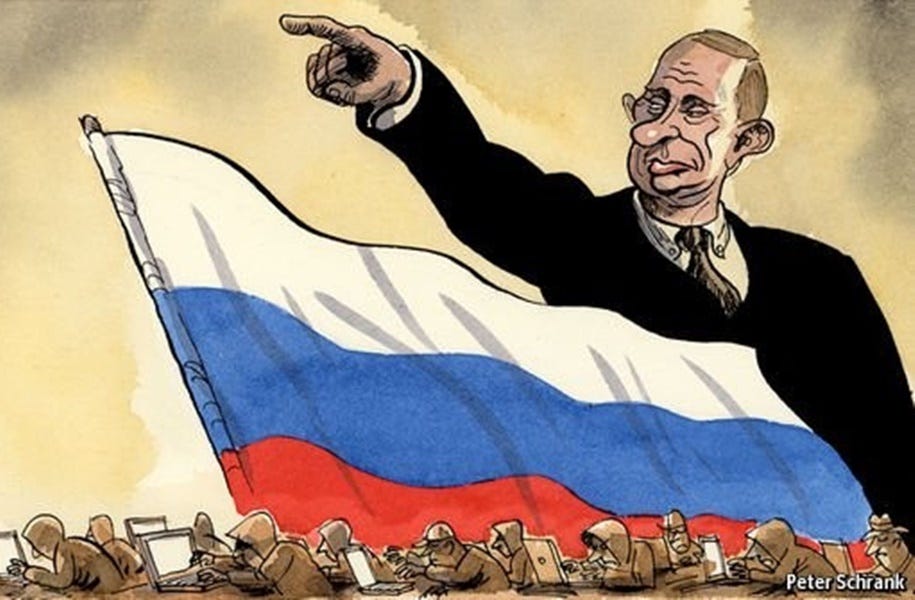Over the past month, Russians have received little new information about what is happening on the front—stubborn and bloody fighting without significant advances on either side. Obviously, that could not substantially shift public opinion. A poll conducted by the Levada-Center at the end of February confirmed this.
The ratio of those who support and do not support the actions of the Russian Army in Ukraine has remained unchanged since spring: Approximately 45% say “definitely yes” to this question, and a little under 30% say “probably yes”; the share of respondents who say “no” is 17%-20%. In this situation, it is certainly possible to argue about the adequacy of the absolute level of supporters of this or that position. Still, the fact is that most of the Russian population does not have reasons to change their views toward the war.
Compared with the January opinion poll, the general attitude of Russians to the war has not changed: Only 22% of respondents (25% in January) think Russia made a mistake when it launched the SMO (Special Military Operation—as the Kremlin calls the war), whereas two-thirds of respondents do not agree with this statement. The proportion of Russians who believe Russia is paying too high a price for participating in the SMO remains stable (64% vs. 65% in January). Less than 30% disagree with this statement. In both cases, respondents’ assessments did not vary significantly by age, place of residence, income level, or extent of approval of President Putin.
In the February survey, we decided to conduct a more in-depth analysis of what lies behind the “peace-loving” position of the Russians: Since September, the proportion of supporters for beginning peace negotiations exceeds, although slightly, the share of supporters of stepping up hostilities (45%-50% vs. 40%-45%). The main conclusion that can be drawn from the recent poll is as follows: The “peace-loving” mood of the Russians is NOT connected with recognizing the unjust/aggressive nature of the unleashed war. Still, it supports the “Putin’s formula”—a peace agreement is possible only on our terms. Almost three-fourths of the respondents (73%) believe that Russia should not make concessions to Ukraine to complete the SMO and sign a peace treaty, including 46% who answered “definitely yes” to this question. The share of those who are ready to make concessions is 20%.
The proportion of those who are ready to make concessions is significantly higher only among those who believe that the country is going the wrong way (38%) and among younger (18-34 years old) respondents (31%). Still, even among them, the share of supporters of the “Putin formula” is noticeably higher (53% and 60%, respectively). The only group in which the percentage of supporters of the “soft” position turned out to be higher is those who disapprove of Putin’s activities as president. Still, the gap is so minimal (45% vs. 44%) that it cannot be considered significant.
The distribution of estimates on this question among respondents who believe the SMO is going unsuccessfully is attractive. The share of supporters of concessions is higher (51% vs. 42%) among those who think that the SMO is “extremely unsuccessful”; however, the share of those who are firmly against concessions is higher than the share of those who are firmly for concessions. Overall, however, the proportion of those confident in the extreme unsuccessfulness of the SMO is so tiny, only 6% of all survey participants, that the probability of a margin of error appears to be very high. In the “expanded” group of those confident in the unsuccessful nature of the SMO (“extremely unsuccessful” and “rather unsuccessful”), the ratio of supporters to opponents of concessions returns to “normal” values, 1:2.
The conclusion about the dominance of supporters of the “Putin formula” in the public consciousness is supported by the answers to other questions received in February. Although only 9% of respondents mentioned Russia’s territorial acquisitions as a goal of the SMO, about 70% of respondents called the return of the four occupied regions to Ukraine “categorically unacceptable” to them as a condition for a peace agreement.



